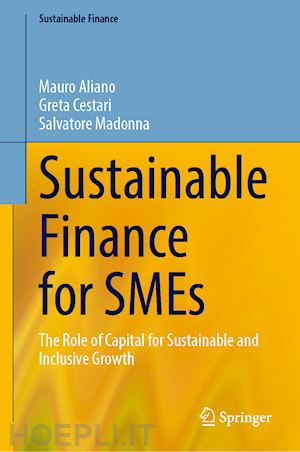
Questo prodotto usufruisce delle SPEDIZIONI GRATIS
selezionando l'opzione Corriere Veloce in fase di ordine.
Pagabile anche con Carta della cultura giovani e del merito, 18App Bonus Cultura e Carta del Docente
One of the greatest challenges facing humanity is to achieve sustainable and inclusive growth. In addition to public and state financial resources, policymakers leverage private companies to promote sustainable growth through green investments and innovations, encouraging private initiatives and financial activities. In this context, SMEs play a crucial role not only at the European level but also as economic actors implementing and pursuing policy goals. This book focuses on the capital and financial aspects of SME activities for sustainable and inclusive growth, aiming to provide a comprehensive overview of the state of the art.
Starting from a business economics perspective, the book discusses financial instruments for both the short and long term. Supply Chain Finance (SCF) offers a theoretical framework for short-term instruments, improving overall supply chain sustainability through companies’ choices of suppliers, buyers, customers, financial institutions, and technology providers. Innovations such as FinTechs and Blockchain can enhance the effectiveness of sustainable business and bring about substantial changes in relationships among different actors.
With regard to long-term instruments like debt capital, the book analyzes the traditional banking channel along with the role of the financial market. Factors such as the impact of FinTechs and other innovations on market efficiency have the potential to change financing activities, making relationships more complex and binding. In this complex system, new laws and regulations can mean sudden changes in terms of providing loans. The banking sector is increasingly using CSR drivers to assess creditworthiness and integrating green lending into credit policy, in keeping with central bank decisions and international board standards. These rules supplement existing ones on prudential supervision, capital buffers, and the broader international regulatory framework for banks.
Lastly, the book explores the potential impact of “greenwashing” on SMEs pursuing sustainable practices. To address this, it proposes an approach to measuring sustainability for Italian SMEs based on a survey of 2500 enterprises and provides Matlab tools for investigating green and other sustainable behaviors.
Part I: Mechanisms and Institutions.- Chapter 1. Sustainable Supply Chain Finance: Bridging Theory and Practice.- Chapter 2. How Can Companies Financially Sustain Their Transition?.- Chapter 3. Integrating ESG Risk into the Banking Prudential Framework in EU: the Impact on SMEs.- Chapter 4. Sustainability and Market Efficiency for SMEs: Bubble or Opportunity?.- Part II: Instruments and Methods.- Chapter 5. Financial Instruments for Green Finance Tailored to SMEs.- Chapter 6. Initial Coin Offering as a Possible Way to Obtain Financial Resources.- Chapter 7. Greenwashing.- Chapter 8. Italian SMEs' Sustainability Scores.- Part III: Companies Crisis.- Chapter 9. Business Crisis and Bankruptcy Prediction Models: The Other Side of Sustainability.- Chapter 10. Bankruptcy Prediction Models: From Predictive Performance to Economic and Organizational Sustainability.
Mauro Aliano is Professor of Banking and Finance at the University of Ferrara (Italy). He specializes in using statistical approaches to analyse financial markets, financial instrument analysis methodologies, and portfolio models. He was Professor in Banking and Finance at the University of Cagliari (Italy) from 2014 to 2018, and a Research Fellow in Statistics for Finance at the University of Rome Tor Vergata (Italy) from 2012 to 2014.
Greta Cestari is an Associate Professor in Business Economics at the University of Ferrara. On November 16th, 2020, she granted the National Scientific Habilitation for the role of Full Professor. Her research mainly focuses on corporate crisis, bankruptcy prediction models and accounting history.
Salvatore Madonna graduated in Business Economics at the University of Pisa and received his PhD at the Sant’Anna School of Advanced Studies in Pisa. He was an Associate Professor at the Faculty of Economics (University of Ferrara) from 2002 to November 2006, when he became a Full Professor. His research mainly focuses on financial statement analysis, company performance measurement, value creation and evaluation, corporate reporting, human capital, corporate crisis, tourist industry management focused on accommodation facilities.











Il sito utilizza cookie ed altri strumenti di tracciamento che raccolgono informazioni dal dispositivo dell’utente. Oltre ai cookie tecnici ed analitici aggregati, strettamente necessari per il funzionamento di questo sito web, previo consenso dell’utente possono essere installati cookie di profilazione e marketing e cookie dei social media. Cliccando su “Accetto tutti i cookie” saranno attivate tutte le categorie di cookie. Per accettare solo deterninate categorie di cookie, cliccare invece su “Impostazioni cookie”. Chiudendo il banner o continuando a navigare saranno installati solo cookie tecnici. Per maggiori dettagli, consultare la Cookie Policy.